Although most of your research may deal with federal or state law, you may find yourself needing to do research on the local government level. This could be a county, parish, borough, town, township, city, municipal corporation, or a village. It could also include a special district organized for a specific purpose such as a water district. Local governments are creatures of state law and possess only those powers granted by the state constitution and/or legislature. Some times the boundaries of local governments will overlap so you may find yourself needing to research more than one local government's documents. This guide will introduce you to local government law.
Please contact any of our UC Law Librarians if you need assistance in finding or using any of the resources in the guide.
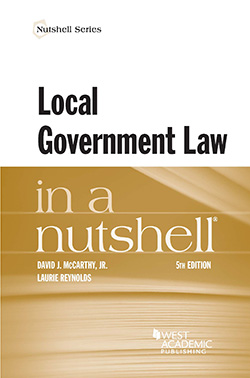 Local Government Law in a Nutshell
by
David J. McCarthy, Jr., Laurie Reynolds
Local Government Law in a Nutshell
by
David J. McCarthy, Jr., Laurie Reynolds
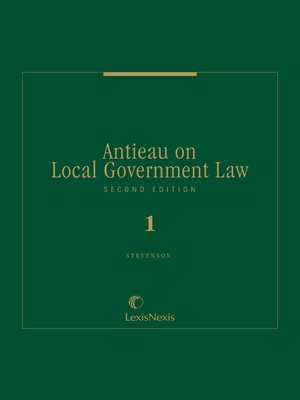 Antieau on Local Government Law
by
Sandra M. Stevenson
Antieau on Local Government Law
by
Sandra M. Stevenson
A comprehensive treatment of local government law that provides a current and complete perspective on municipal corporations, as well as independent local government entities, and counties, while adding emerging topics such as telecommunications.
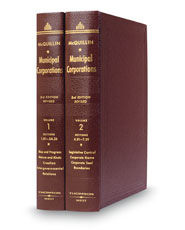 Law of Municipal Corporations
by
Eugene McQuillin
Law of Municipal Corporations
by
Eugene McQuillin
This publication provides expert coverage of all aspects of municipal law, quick access to materials via a uniform decimal numbering system, and majority and minority positions with federal and local case annotation, arranged by jurisdiction. It also provides assistance in conducting additional research or for conducting complex litigation, with official and parallel citations and detailed footnotes.
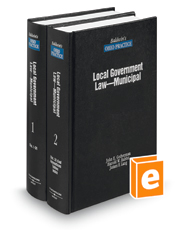 Local Government Law
by
C. Dallas Sands, Michael E. Libonati, John Martinez
Local Government Law
by
C. Dallas Sands, Michael E. Libonati, John Martinez
This set gives you a fundamental understanding of local government law and upcoming trends. It focuses on the entity's power to act and provides a fresh approach to solving local government problems. It thoroughly describes the regulatory powers of government and their application. The text also takes municipal law a step further by emphasizing the interrelationships among the various units of government: local and federal government, localities and the state, and between local government entities.
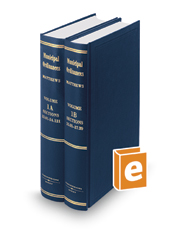 Municipal Ordinances; Text and Forms (Matthews Municipal Ordinances)
by
Thomas A. Matthews & Byron S. Matthews
Municipal Ordinances; Text and Forms (Matthews Municipal Ordinances)
by
Thomas A. Matthews & Byron S. Matthews
A practical guide to drafting a variety of ordinances that are both legally correct and understandable to the courts, municipal officials, and the general public. The most complete set of municipal ordinances available.
 Understanding Local Government
by
Sandra M. Stevenson
Understanding Local Government
by
Sandra M. Stevenson
Within the framework of state law, the municipalities often adopt a charter. Like the federal or state constitution, the charter describes the powers, duties, and responsibilities of the particular local government unit. For example, a person doing research in the municipal law of Cincinnati might wish to consult Cincinnati’s City Charter.
A local government will pass ordinances which are "laws" having force and effect within the boundaries of the entity. These ordinances are often compiled into codes, a subject arrangement of the ordinances. Many municipal codes are now available online, however, be aware that these sources may not be considered official versions of the code.
There is not one master website containing charters, ordinances, or codes but many code publishers make their codes available online for free. If you do not find your particular code through one site, be sure and search the additional publisher websites.
Most municipal codes do not provide references to cases ("annotations") that apply and interpret city charters and ordinances.
An easy way to find ordinances online is to browse sources and search sources for "municipal codes" in Lexis , or Municipal Law in Westlaw (there is a Municipal Practitioner tab in Westlaw that you can add).
University of Cincinnati Libraries
PO Box 210033 Cincinnati, Ohio 45221-0033
Phone: 513-556-1424
University of Cincinnati
Alerts | Clery and HEOA Notice | Notice of Non-Discrimination | eAccessibility Concern | Privacy Statement | Copyright Information
© 2025 University of Cincinnati
